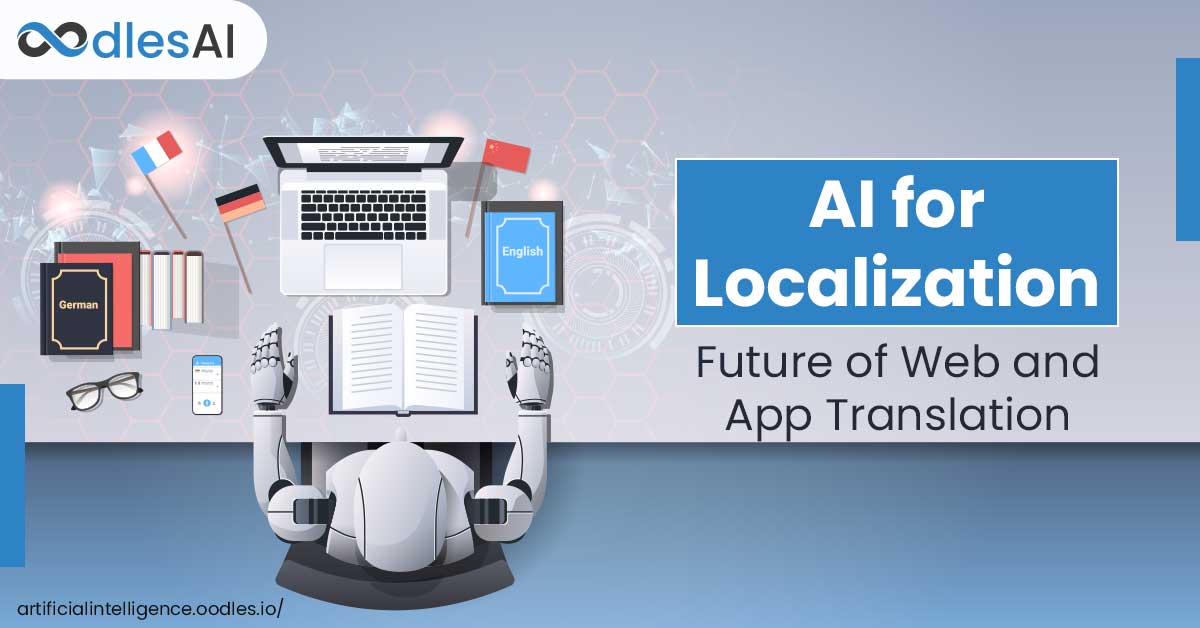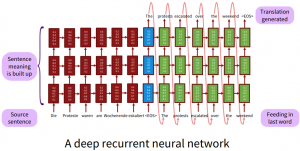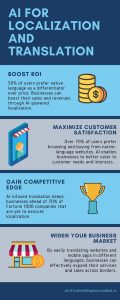AI for Localization: Future of Web and App Translation
Sanam Malhotra | 22nd May 2020

Artificial Intelligence (AI) is a propelling force for a physically locked-down world paving way for digital transformation. With promising translation and localization abilities, AI is opening opportunities for businesses to target new markets across borders. As a well-experienced provider of AI development services, Oodles AI sizes the potential of AI for localization and translation of digital content.
Let’s explore how AI performs localization to optimize digital content and improve customer satisfaction beyond translation.
How AI Performs Language Translation
Language translation with AI employs machine learning (ML) algorithms to understand the meaning and relationship of words and phrases. Under data science, the AI approach to language translation is termed as “Neural Machine Translation” or NMT. Within the approach, an ML model interprets the language’s intent and predicts the lily sequence of words.

The architecture of an NMT model as explained by researchers at Google.
NMT has demonstrated significant potential for decoding the meaning of the source sentence and using a deep recurrent neural network for final translation. Contrary to the earlier versions, namely ‘Phrase-based MT’ and ‘Syntax-based MT’, NMT has achieved remarkable accuracy in translation with these three big wins-
1) End-to-end training
2) Better representation of the word and phrase similarities
3) Greater utilization of context
AI for Localization: Delivering Omnichannel Experience
Considering the dynamics of consumer demands globally, NMT has emerged as a boon for the digital landscape. Aimed at improving customer interactions, machine learning development services and NMT are beginning to enter global business setups including call centers, news outlets, eCommerce, and online learning platforms.
Bruno Herrmann, former digital globalization leader at Nielsen, projects an exponential demand for AI-powered translation in the industry, suggesting,
“Due to the progress of machine learning, data-driven localization is becoming the standard because internationally, customer journeys are becoming more fragmented. If organizations are not using data to deliver on translation and localization, they will likely miss key parts of those fragmented customer journeys.”
For marketers, merely translating a website is not enough. To deliver enhanced and consistent customer experience across channels, marketers need to ensure that the entire content is specifically localized. Of course, AI cannot altogether replace human translators and linguistics. However, a combination of machines and human expertise will greatly impact business performance.
Also read- Copy That: Realistic Voice Cloning with Artificial Intelligence
Business Benefits of Employing AI for Localization and Translation
Implementing AI for localization and translation entails a chain of benefits from enhanced customer experience to lower operational costs. In addition, it is relatively cheaper to deploy NMT models across websites, mobile apps, web-based apps, and social media platforms. We, at Oodles AI, represent some of the most vital business benefits of AI-based localization as below-

Also read- Improving Business Communications and Human Interactions with NLP
Deploying AI for Localization and Translation With Oodles AI
The ever-expanding size of digital content and online customers sparks the need for businesses to digitalize and localize more than ever. In these difficult times, when consumer markets are experiencing drastic shifts in demand and supply, businesses are only able to adapt and survive through technological innovations.
We, at Oodles, are making all possible efforts to turn this dreadful time into an opportunity for global businesses.
Our hands-on experience in deploying AI-backed Natural Language Processing and sentiment analysis models led us to explore the capabilities of AI for localization and translation. Diverse online businesses can deploy AI for localization and translation with these effective applications-
a) Localized eCommerce Platforms
eCommerce businesses can target new markets and increase sales by using neural networks for accurate and mindful localization. AI’s ability to convert numbers to digits in their spoken form can assist users in making quick buying decisions, thereby accelerating ROI. Also, discover how eCommerce businesses can deploy AI’s computer vision technology for personalizing the customer experience and accelerating conversions.
b) Customized Chatbots
AI-powered chatbots are becoming a household name with a majority of businesses adopting chatbot development services to automate customer interactions. Now, AI can make more contextual conversations by translating responses to the local language for better user engagement.
b) Optimized Websites and Mobile App
While brands spend millions of dollars on improving their original site’s SEO, they fail to realize the importance of optimizing the translated website. Global marketers suggest that it is imperative to optimize translated websites not only for standardizing content but also for minding cultural sentiments, idiomatic correction, and punctuation. With data-driven training, AI performs more effectively to identify and rectify these errors than humans.
To learn more about how Oodles AI deploys AI for website localization and translation, connect with our team of AI experts and developers.



